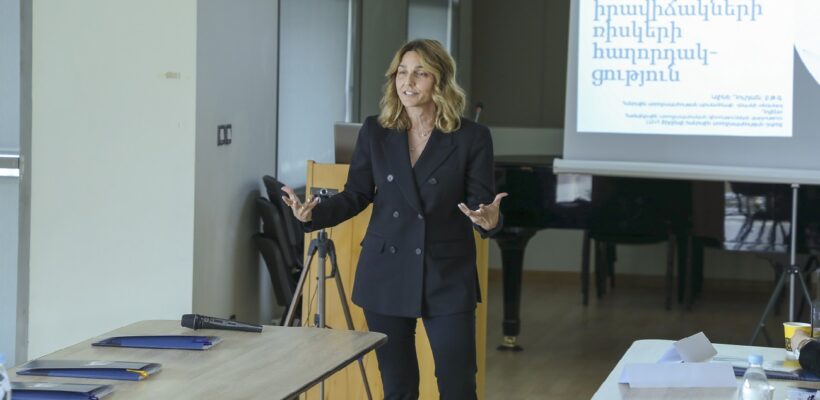
Trainings in Health Behavioral Change and Risk Communication
2 min read
YEREVAN, Armenia — The Turpanjian College of Health Sciences (CHS) of the American University of Armenia (AUA) successfully conducted two comprehensive training sessions in late May. The first was dedicated to training representatives from various ministries of the Republic of Armenia (RA), while the second focused on training community leaders. The training addressed critical topics related to health behavior change, risk communication during emergency situations, and associated personal data protection and privacy. The training was organized within the framework of the USAID-funded “Support to Control COVID-19 and Other Infectious Diseases” project in collaboration with the RA Ministry of Health.
Health behavior change and risk communication are very important for dealing with the challenge of infectious diseases, including COVID-19. To address this need, CHS has been conducting training over the past two years to properly train representatives from different ministries, community leaders, and healthcare workers to function effectively in such emergencies.
Fifty-nine participants from four ministries, one inspectorate body, and representatives from twenty-nine consolidated local communities attended the training. Renowned experts in the field Dr. Tsovinar Harutyunyan, associate professor at CHS, and Dr. Alina Dorian, associate dean of the UCLA Fielding School of Public Health, facilitated the sessions, providing invaluable insights into the topic and practical guidance for implementing effective strategies in health behavior change and risk communication. Additionally, Suren Krmoyan, JD, reviewed with the participants the existing regulations and primary principles of personal data protection and privacy.
On both days, the participants learned about evidence-based interventions and best practices for promoting positive health behaviors within the population. The sessions also emphasized tailoring communication messages to different target groups in order to maximize their impact. The participants gained a thorough understanding of crisis communication strategies, crisis management, and the importance of timely and accurate information dissemination. The training emphasized the significance of maintaining public trust and effectively addressing rumors and misinformation.
One of the participants expressed her satisfaction with the training, “I will use positive messaging for risk communications with the general public and accordingly choose my target audiences. Moreover, I will provide citizens with the required personal information, except when legally prohibited,” she remarked.
The evaluation of the training sessions demonstrated that most participants were pleased with the training and found the topics highly informative and important.
The AUA Turpanjian College of Health Sciences works actively to improve population health and health services in Armenia and the region through interdisciplinary education and development of health professionals to be leaders in public health, nursing, health services research and evaluation, and health care delivery and management.







